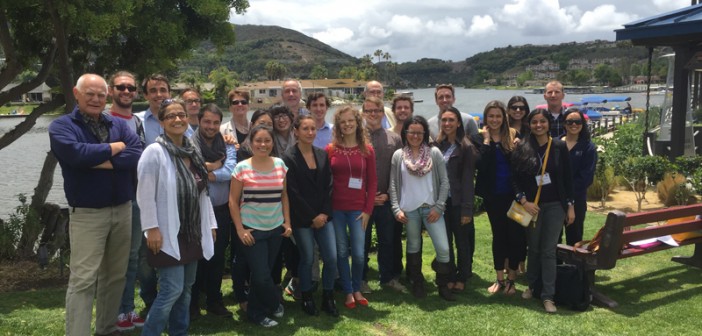On May 13-18, Sanford-Burnham’s Graduate School of Biomedical Sciences held its sixth annual retreat in San Marcos, Calif.
This year’s theme, “Effectively Communicating Scientific Research to a Broad Audience,” gave the students an opportunity to share their research and practice explaining their work in simple terms—simple enough for non-scientists.
Organized by Francesca Boscolo Sesillo, Mirco Guigli, and Gianluigi Lichinchi, all graduate students at the Institute, the presenters were encouraged to address questions such as:
- Why the research is important
- How will it advance our understanding of the subject matter
- Will the research impact human health
As a very grateful invited guest, I was dazzled by the presentations. Many of the students included analogies and graphics that made some very complex information—structured illumination resolution, haploinsuffient photoreceptors, SWI/SNF BRAHMA chromatin remodeling, just to name a few—clear enough for this “arm-chair” scientist to be dangerous.
For many reasons, effectively communicating science to non-scientists and scientists within other disciplines is critical. Like it or not, when you explain science you are selling. You may be selling your ideas to seek funding and grants, convincing others of your findings, or recruiting people to work on your project.
The students took it seriously, not only because many of their mentors and advisors were in the audience, but also because they were scored on a scale of 1-5 for quality, content, and clarity of the presentations. When the score cards were tallied the winner was… (drum roll, please)
Francesca Boscolo Sesillo (Sacco Lab)
Francesca, a third year student, presented her research on the role of p21 during skeletal muscle regeneration. Her findings show that p21, a cell cycle inhibitor, plays a key role in the activation and differentiation of muscle stem cells. Understanding the mechanisms that lead to muscle regeneration has important implications for future interventions that can improve muscle health in the elderly as well people with degenerative disorders such as muscular dystrophy.
Many congratulations to all the fabulous students, and to Guy Salvesen, Ph.D., Dean of the Graduate School, for providing leadership and education opportunities for the students.
And a special thanks to:
- Fiona Scott, PhD, Associate Director of Biology at Receptos, who shared her professional experience as scientist in clinical research.
- Thomas Baldwin, PhD, Dean of Natural and Agricultural Sciences at UC Riverside for contributing to the communication training provided to the students.
- America Vega and Stacy Smith for organizing the retreat.
- And to Pfizer, Genentech, and Receptos, for underwriting the event.
